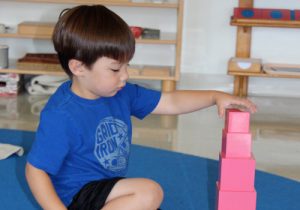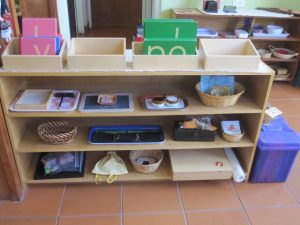So just what is the Montessori Philosophy and how does this work in Practice?
3rd May 2018
Share this entry:
“We discovered that education is not something which the teacher does, but that it is a natural process which develops spontaneously in the human being.” Maria Montessori.

The first thing I noticed when walking into the Montessori classroom is that it belongs to the children rather than the teacher. The curriculum is ready for use on open shelves at the children’s level, allowing them to make their own decisions about what “work” they are going to choose. The resources are aesthetically pleasing, most using natural resources and are sized in order to be easy for the children to manipulate. Notably these materials are placed in baskets or trays and on shelves placed in the different areas of the Montessori curriculum. An example of this being in the practical life area, where a child will pick up a tray containing two jugs of water of the shelf and carefully transport it to their table. The child will then begin to transfer the water from jug to jug increasing their concentration and motor skills. When the child has finished with their work they are encouraged to replace it to where they find it on the shelf ready for another child to use. This approach not only fosters independence but also teaches the children to have a respect for their environment and the materials in it.
Children are also encouraged to take responsibility for their own belongings from how to put on their shoes and jackets through to where they need to put their bags. Practitioners spend time practicing these skills with the children which takes patience and fosters a mutual respect between themselves and the children in their care. Children quickly become familiar with their daily routine and are gradually introduced to further Montessori activities such as caring for plant and animals, which currently in my pre-school are watching our tadpoles slowly becoming frogs! They also learn how to serve their own snack or lunch, how to wash their own hands and other activities they will encounter through their everyday day lives.
It is a real pleasure for me as a practitioner to watch the children in my care grow in competency in their use of these materials thus growing in confidence and becoming independent little learners!
By Marie-Louise Cadagan
Why attend Childcare Expo?
Join over 2,500 like-minded individuals from the early years sector who are dedicated to improving both practice and their childcare settings.
Attend educational seminars to credit your CPD
Meet the experts to have your questions answered
Receive fantastic onsite offers and discounts
Experience expert-led informative hands-on workshops
Network with peers and industry players
Pick up hundreds of new product ideas and services
And most of all, enjoy a great day out with your colleagues




